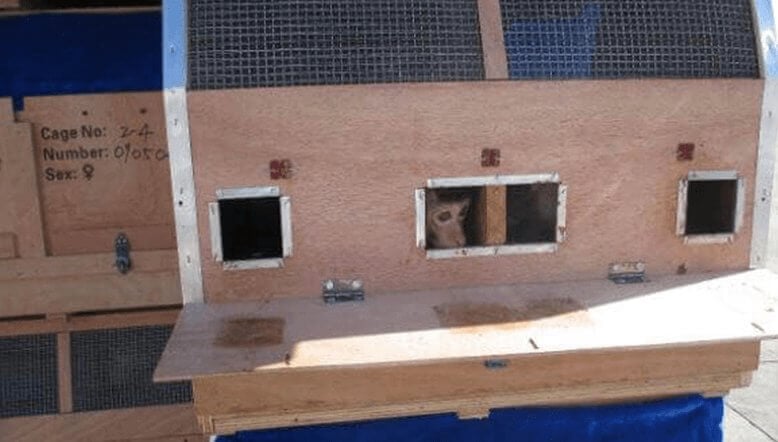
[ad_1]
Shady monkey-transport company JKL Secure Freight just can’t keep on the right side of the law and recently drew, yet again, the attention of federal inspectors, who cited it with two counts of violating the federal Animal Welfare Act (AWA).
The company, which has been caught numerous times committing various violations, was cited by the U.S. Department of Agriculture (USDA) after 336 long-tailed macaques—just off a 9,000-mile journey—were forced to sit for as long as 95 minutes in the boiling Georgia heat, confined to wooden crates on the tarmac of Hartsfield-Jackson Atlanta International Airport.

The USDA inspection report obtained by PETA said it was so hot that day that airport employees couldn’t make it through a shift safely without taking breaks to cool off. Yet the monkeys, who had endured a flight from the island nation of Mauritius, east of Africa, while being forced to sit in their own urine and feces, were given no respite from the unrelenting heat.
According to the inspection report, after the crates of terrified and likely heat-exhausted monkeys had been left for over an hour in the baking-hot sun, JKL employees treated them like sacks of flour—dragging them across the ground, tilting them into a trailer, and dropping them inside. We’ve asked the Atlanta Police Department to investigate.
This recklessness undoubtedly caused even more fear, panic, and harm and increased the likelihood of exposing humans to deadly pathogens the monkeys might have been carrying.
This was the first shipment of monkeys to arrive at the airport in years, and staff were apparently unprepared to handle a mass importation of these sensitive individuals—otherwise, they might have insisted that JKL do its job properly.
JKL’s Extensive Rap Sheet
JKL has now racked up five violations of the AWA, including the two in Atlanta, since 2018. The feds have also slapped the company with citations—the first two in response to complaints from PETA—for the following violations:
- Trucking 167 monkeys across the U.S. without proper veterinary exams in April 2023, which could have endangered the public.
- Ignoring, on 14 separate occasions, the AWA regulation that requires a veterinarian to examine all animals transported between laboratories and/or breeding facilities within 10 days. JKL was cited for this in June 2022.
- Ignoring, with deadly consequences, a federal regulation requiring that nonhuman primates be observed at least once every four hours while in transit. In October 2018, the USDA cited JKL after a monkey who had not been observed for 10.5 hours was found unresponsive in a shipping crate. The animal died after not responding to treatment.
JKL’s Gallery of Rogue Cohorts
JKL trucks monkeys to and from some notorious organizations, including the following, so they can be used and killed in experiments:
- Charles River Laboratories, the world’s largest breeder of animals for use in experiments, which supplies one of every two animals used in experimentation (As one of the largest importers of monkeys into the U.S., this company is partially responsible for emptying the world’s forests of long-tailed macaques.)
- The Washington National Primate Research Center (WaNPRC), the failing, disease-ridden facility at the University of Washington that has tormented thousands of monkeys in painful experiments that have failed to improve human health in more than 60 years
- Tulane National Primate Research Center, the site of a Biosafety Level 3 laboratory where nasty diseases that can cause “serious or potentially lethal disease” are studied (Dozens and dozens of monkeys have escaped from this location.)
- Orient BioResource Center, whose former vice president Gary Tucker was convicted of lying to U.S. Fish & Wildlife Service federal agents during their investigation into the potential illegal trafficking of monkeys
- Envigo, the company that has sponged more than $89 million from taxpayers since 2008 through contracts with the National Institutes of Health and which supplies monkeys to laboratories around the U.S., including the WaNPRC (It also used to operate a massive beagle-breeding facility in Cumberland, Virginia, before PETA began uncovering the horrors there.)
- Covance, a scalpel-for-hire that imprisons thousands of monkeys in its laboratories and subjects them to tests for everything from drugs to industrial chemicals for its clients
What You Can Do
The monkey-experimentation industry has pushed both long- and pig-tailed macaques to the brink of extinction. Please TAKE ACTION today and tell the Centers for Disease Control and Prevention that you will not sit idly by while endangered primates are ripped from their homes and dumped into laboratory cages:
[ad_2]
Source link

Leave a Reply